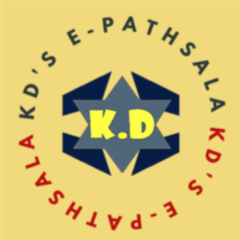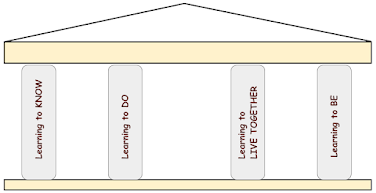The UNESCO (United Nations Educational, Scientific and Cultural Organization), in 1993, appointed the International Commission on Education for the Twenty-first Century under the chairmanship of Jacques Delor. The members of this commission comprised 14 members from different countries including Dr. Karan Singh from India. The report of this commission was published in 1996 by the name of ‘Learning: The Treasure Within’. In the view of the commission, there will be four bases of education in the twenty first century:
1. Learning to know
2. Learning to do
3. Learning to live together
4. Learning to be
The commission’s report presents these as the four pillars of education.
1. Learning to Know
In the view of Delor’s Commission, the more knowledge we possess, the better we can understand the different aspects of our environment. Learning to know implies learning how to learn by developing one’s concentration memory skills and ability to think. Every individual has hidden talents such as- 1. Memory, 2. Reasoning, 3. Imagination, 4. Physical ability, 5. Aesthetic sense, 6. Aptitude to communicate.
From infancy, young people must learn how to concentrate – on objects and on other people. The development of memory skills is an excellent tool for countering the overpowering stream of instant information put out by the media. It would be dangerous to conclude that there is no point in people improving their memory skills because of the vast amount of information storage and distribution capacity available. While some selectivity is undoubtedly required when choosing facts to be “learned by heart”, there are numerous examples of the human memory’s ability to outperform computers when it comes to establishing connections between memorized facts that apparently have very little to do with each other. The specifically human ability of associative memorization is not something that can be reduced to an automatic process; it has to be carefully cultivated.
2. Learning to Do
According to Delor’s Commission, the first type of industrial communities require learning as well as skill training. Not only this, this type of communities require to learn professional skills as well as social skills and communication skills. Also, the people have to develop common sense, decision-making power and leadership qualities. The commission has explained that in the twenty-first century, most of the countries in the world will have the industrial system; therefore, it is essential that children are trained in these skills right from the beginning.
3. Learning to Live Together
In the commission’s view, the first thing for this is to cultivate the ability to understand one another. Unless all people are able to understand others, they will not like to live together. Our modern needs have so expanded today that we are no more self-dependent even in our family, social and national matters, and leave alone international level. In the view of the commission-
1. Education should train children to understand others.
2. Children should be trained to cooperate with one another for the attainment of goals right from the beginning.
The commission has clarified that now all nations of the world will have to resolve their mutual differences, will have to sow the seeds of peace instead of that of war, and will have to solve one another’s problems in mutual cooperation. Therefore, it is essential that children be trained to live together right from the beginning and be taught a lesson of peace and harmony in place of conflict and struggle. Values to be developed amongst students- Non Violence, Cooperation, Selfless attitude, Developing values, Accepting human diversity.
4. Learning to Be
In the view of Delor’s Commission, the recommendations of Edgar Faure Report will be useful for the twenty-first century will have to take some independent decisions in order to become something and advance at all times, and understand his personal responsibility with a will to carry it out. In the opinion of Delor’s Commission, such an educational system is needed in the twenty-first century by which-
1. The aptitude and latent talents of children and people can be brought out.
2. Children’s personalities can be fully developed.
3. Physical abilities and mental abilities (memory, reasoning, and imagination) can be developed in children.
4. Social skills and aesthetic sense and communication skills of children can be cultivated together with leadership ability.
In the opinion of the commission, only such people will be able to guard themselves in the twenty-first century. According to Alvin Toffler,-“ The illiterate of 21st century will not be those who can not read or write but those who can not learn ,unlearn and relearn”.
- https://www.academia.edu/36666914/Introduction_to_the_Social_Dimensions_of_Education_Introduction_to_the_Social_Dimensions_of_Education
- https://www.linkedin.com/pulse/illiterate-21st-century-those-who-cannot-learn-dominique-forand-mba





